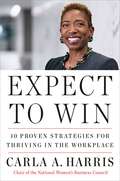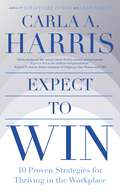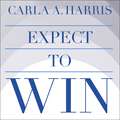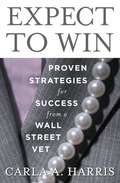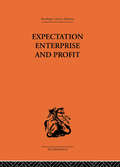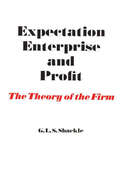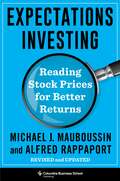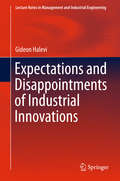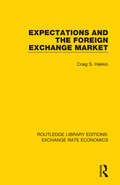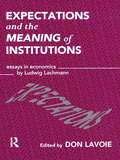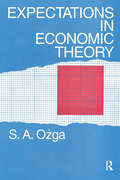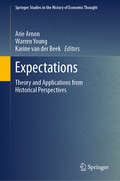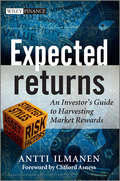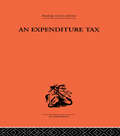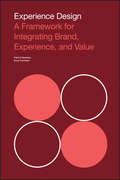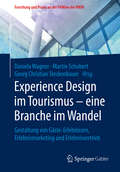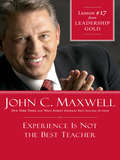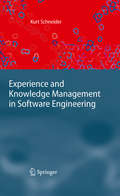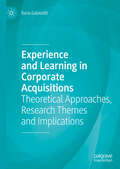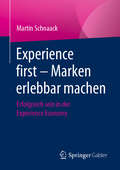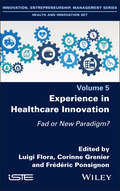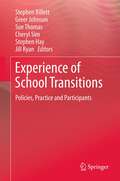- Table View
- List View
Expect to Win: 10 Proven Strategies for Thriving in the Workplace
by Carla A HarrisHow to survive and thrive in any economic climate with proven strategies from a powerhouse Carla Harris, one of the most powerful and respected women in business and Chairperson of the National Women's Business Council, shares advice, tips, and strategies for surviving in any workplace environment. While climbing the corporate ladder, Harris had her own personal missteps and celebrated numerous victories. She vowed that when she reached senior management, and people came to her for advice, she would provide them with the tools and strategies honed by her experience."Carla's pearls" have become the centerpiece for her many speeches and television appearances. In Expect to Win, Carla shares these valuable lessons, including:* Authenticity: The Power is You* The 90-Day Rule* Perception is the Co-Pilot to Reality* The Mentor, The Sponsor, The Adviser: Having Them All* Leverage Your Voice* Balance is a Necessity: Use Your Passions to Achieve it* Expect to Win: Show Up With Your Best Self Every Day* Expect to Win is an inspirational must-read for anyone seeking battle-tested tools to fulfilling their true potential and for fans of Sheryl Sandberg's Lean In.
Expect to Win: 10 Proven Strategies for Thriving in the Workplace
by Carla HarrisCarla Harris is one of the world's most senior Black women in global finance. Highly successful and respected, in her first book Expect to Win she shares advice, tips, and strategies for surviving in any workplace environment. While climbing the corporate ladder, Harris had her own missteps and celebrated numerous victories. She vowed that when she reached senior management, and people came to her for advice, she would provide them with the tools and strategies honed by her experience. "Carla's Pearls" have become the centerpiece for her many speeches and television appearances. Now, Carla shares these valuable lessons, including: · Authenticity: The Power is You · The Ninety-Day Rule · Perception is the Copilot to Reality · The Mentor, the Sponsor, the Adviser: Having Them All · Leverage Your Voice · Balance is a Necessity: Use Your Passions to Achieve It · Expect to Win: Show Up with Your Best Self Every Day Expect to Win is an inspirational must-read for anyone seeking battle-tested tools for fulfilling their true potential.
Expect to Win: 10 Proven Strategies for Thriving in the Workplace
by Carla HarrisHow to show up with your best self every day and fulfil your true potential, from one of the world's most successful Black women in finance.Carla Harris is one of the world's most senior Black women in global finance. Highly successful and respected, in her first audiobook Expect to Win she shares advice, tips, and strategies for surviving in any workplace environment. While climbing the corporate ladder, Harris had her own missteps and celebrated numerous victories. She vowed that when she reached senior management, and people came to her for advice, she would provide them with the tools and strategies honed by her experience. "Carla's Pearls" have become the centerpiece for her many speeches and television appearances. Now, Carla shares these valuable lessons, including: · Authenticity: The Power is You · The Ninety-Day Rule · Perception is the Copilot to Reality · The Mentor, the Sponsor, the Adviser: Having Them All · Leverage Your Voice · Balance is a Necessity: Use Your Passions to Achieve It · Expect to Win: Show Up with Your Best Self Every Day Expect to Win is an inspirational must-read for anyone seeking battle-tested tools for fulfilling their true potential.(P) 2022 Penguin Audio
Expect to Win: Proven Strategies for Success from a Wall Street Vet
by Carla HarrisOne of Wall Street's most powerful and lauded women shares her strategies for long-term success in any career.
Expectation, Enterprise and Profit: The Theory Of The Firm
by G.L.S. ShackleG.L.S. Shackle made numerous, pioneering contributions to the study of uncertainty in economic life. This volume studies the production process, where resources must be committed to specific technological purposes long in advance of the ultimate sale of goods to the consumer. The problems of such a system rest on the durability of the instruments it uses, whose huge expense can only be recouped if they can be used for many years. Yet at the time of investment, those years of use are in the future and uncertain. The firm is the essential institutional means of confronting this uncertainty. Expectation, Enterprise and Profit is concerned with the nature and mode of life of the firm as a means of policy formation in the face of uncertainty.Chapters include:The Nature and Matrix of Production, Investment and Expectation, Interdependent Decision-Making and Profit and Equilibrium.
Expectation, Enterprise and Profit: The Theory of the Firm
by G. L. ShackleProduction is a complex system of interdependent activities, necessary to the system as a whole, which itself depends on the continuance of each individual activity that composes it. In such a system, resources must be committed to specific technological purposes long in advance to the ultimate sale of goods to the consumer.The success of such an enterprise system rests on the durability of the instruments it uses. These are so complex, sensitive, and powerful that their huge expense can be recovered only if they can be used for many years. Yet when the decision is made to invest in them, those years of use are in the future and the conditioning circumstances are unobservable and unknown.The firm in Western economies is the essential institutional means of confronting this problem of uncertainty, Expectation, Enterprise and Profit: The Theory of the Firm is concerned with the nature and mode of life of the firm as a means of policy formation in the face of uncertainty.This book offers a concise treatment and excellent analysis of the major concepts studied in a first course in the theory of the firm.
Expectations Investing: Reading Stock Prices for Better Returns, Revised and Updated (Heilbrunn Center for Graham & Dodd Investing Series)
by Alfred Rappaport Michael MauboussinMost investment books try to assess the attractiveness of a stock price by estimating the value of the company. Expectations Investing provides a powerful and insightful alternative to identifying gaps between price and value.Michael J. Mauboussin and Alfred Rappaport suggest that an investor start with a known quantity, the stock price, and ask what it implies for future financial results. After showing how to read expectations, Mauboussin and Rappaport provide a guide to rigorous strategic and financial analysis to help investors assess the likelihood of revisions to these expectations. Their framework traces value creation from the triggers that shape a company’s performance to the impact on the value drivers. This allows a practitioner of expectations investing to determine whether a stock is an attractive buy or sell candidate.Investors who read this book will be able to evaluate stocks of companies in any sector or geography more effectively than those who use the standard approaches of most investors. Managers can use the book’s principles to devise, adjust, and communicate their company’s strategy in light of shareholder expectations.This revised and updated edition reflects the many changes in accounting and the business landscape since the book was first published and provides a wealth of new examples and case studies.
Expectations and Disappointments of Industrial Innovations
by Gideon HaleviThe Integrated Manufacturing System (IMS), Group Technology, Numerical Control, and Computer Aided Design (CAD) were four outstanding innovations that were one-time milestones of scientific industrial management. This book describes the expectations and disappointments of the common pitfalls of these ingenious ideas, which leads to understanding of their gradual disappearing, and proposes a way to restore these methods for long term utility and value. The first three innovations dominated the industry till the mid-1970s. Surprisingly, the reason for them being replaced is the same: research of the "routine" was misleading regardless of its ingenuity. In the fourth case, CAD does not support CAPP (Computer Aided Process Planning) and thus Numerical Control could no longer support developments of a system such as a flexible and automated factory. However, they incorporate many features in a specific resource instead within a manufacturing system. CAD technology and machining centers remain remarkable as a specific (unique) manufacturing resource. This work proposes ways to revive these innovations for the future. Innovation is a driver for the development of new products and production methods. It should be an integral part of a system and not pursued for its own sake. This volume shows, explains, and remedies this by treating these interesting examples.
Expectations and the Foreign Exchange Market (Routledge Library Editions: Exchange Rate Economics)
by Craig S. HakkioOriginally published in 1984. This book examines two important dimensions of efficiency in the foreign exchange market using econometric techniques. It responds to the macroeconomics trend to re-examining the theories of exchange rate determination following the erratic behaviour of exchange rates in the late 1970s. In particular the text looks at the relation between spot and forward exchange rates and the term structure of the forward premium, both of which require a joint test of market efficiency and the equilibrium model. Approaches used are the regression of spot rates on lagged forward rates and an explicit time series analysis of the spot and forward rates, using data from Canada, the United Kingdom, the Netherlands, Switzerland and Germany.
Expectations and the Meaning of Institutions: Essays in Economics by Ludwig M. Lachmann (Routledge Foundations of the Market Economy)
by Don LavoieThis collection of Ludwig Lachmann's essays challenges contemporary attitudes to economics and seeks to apply an interpretive approach to the discipline. The essays, spanning six decades, address a wide range of issues in microeconomics, macroeconomics, methodology and the history of thought. They outline Lachmann's approach to economics, with the emphasis on the meaning of human institutions in a world of unpredictable change, rather than on quantitative and stable relations. Collecting Lachmann's most important work together for the first time, it includes two essays never previously published.
Expectations in Economic Theory
by S. A. OzgaThis book deals with economic theory, not methodology. It does employ certain methodological resolutions. These resolutions and the limitations they impose on the nature and the scope of the analysis are reviewed. The first resolution concerns what kind of a theory is to be discussed. The word theory may mean many things; it may mean a hypothesis put forward as an explanation of something, an idea, or a notion. In a normative sense it may mean a recommendation, a rule, or principle to be followed. In science it usually means a system of hypotheses to be accepted as an explanation of certain facts, a set of general laws, and principles. It is also used to distinguish the general principles and methods of a subject from the practice of it.The theory with which this volume is concerned is that of science. In very general terms it may be defined as a system of hypotheses, one following from another, which permits the reader to derive from known facts and predictions of other facts. If the knowledge of the fact which we predict is important for us, in the sense that it permits us to achieve better the objectives we pursue, the theory may have a practical value. This book is therefore not only a contribution to the analysis of expectations but also an introduction to a number of selected topics in economic theory.
Expectations in Economic Theory
by S. A. OzgaThis book deals with economic theory, not methodology. It does employ certain methodological resolutions. These resolutions and the limitations they impose on the nature and the scope of the analysis are reviewed. The first resolution concerns what kind of a theory is to be discussed. The word theory may mean many things; it may mean a hypothesis put forward as an explanation of something, an idea, or a notion. In a normative sense it may mean a recommendation, a rule, or principle to be followed. In science it usually means a system of hypotheses to be accepted as an explanation of certain facts, a set of general laws, and principles. It is also used to distinguish the general principles and methods of a subject from the practice of it.The theory with which this volume is concerned is that of science. In very general terms it may be defined as a system of hypotheses, one following from another, which permits the reader to derive from known facts and predictions of other facts. If the knowledge of the fact which we predict is important for us, in the sense that it permits us to achieve better the objectives we pursue, the theory may have a practical value. This book is therefore not only a contribution to the analysis of expectations but also an introduction to a number of selected topics in economic theory.
Expectations: Theory and Applications from Historical Perspectives (Springer Studies in the History of Economic Thought #Vol. 65)
by Arie Arnon Warren Young Karine van der BeekThis book provides a unique historical perspective on expectations in economic theory, and applications of expectations models in economic history. Based on papers presented at the 2017 Thomas Guggenheim Conference, it brings together the work of economists, historians of economics, and economic historians on issues and events concerning expectations in economics and economic history. The contributions address: (i) the history of expectations models; (ii) growth, expectations and political economy; (iii) controversies regarding expectations methods and models; (iv) expectations in theory and reality; and (v) expectations in economic history. The book opens with a lecture by Thomas Guggenheim Prize winner Duncan Foley on the evolution of expectations in modern economic thought. The remaining content is divided into two parts, the first of which focuses on the utilization of expectations in the “ancient” and “meso” periods of high theory, i.e., from Smithian to Keynesian approaches. The papers cover topics such as “modern” applications of expectations in both “Tobinesque-Phillips” and “Harrodian-Solowian” contexts, and the debate between Friedmanite and Keynesian approaches to expectation formation. In turn, the last part presents essays on the role of economic expectations in connection with historical events and contexts, ranging from the early 20th century to World War II, and on the application of expectations theory to hyperinflation and stabilization, taking Israel as a case study.
Expected Returns
by Antti IlmanenThis comprehensive reference delivers a toolkit for harvesting market rewards from a wide range of investments. Written by a world-renowned industry expert, the reference discusses how to forecast returns under different parameters. Expected returns of major asset classes, investment strategies, and the effects of underlying risk factors such as growth, inflation, liquidity, and different risk perspectives, are also explained. Judging expected returns requires balancing historical returns with both theoretical considerations and current market conditions. Expected Returns provides extensive empirical evidence, surveys of risk-based and behavioral theories, and practical insights.
Expected Returns: An Investor's Guide to Harvesting Market Rewards
by Antti IlmanenThis comprehensive reference delivers a toolkit for harvesting market rewards from a wide range of investments. Written by a world-renowned industry expert, the reference discusses how to forecast returns under different parameters. Expected returns of major asset classes, investment strategies, and the effects of underlying risk factors such as growth, inflation, liquidity, and different risk perspectives, are also explained. Judging expected returns requires balancing historical returns with both theoretical considerations and current market conditions. Expected Returns provides extensive empirical evidence, surveys of risk-based and behavioral theories, and practical insights.
Expenditure Tax (Modern Revivals In Economics Ser.)
by Nicholas Kaldor'This is one of those rare technical books which has an importance outside its own field' The Daily Telegraph.'One of the most stimulating post-war books on public finance' The Guardian.Part 1 examines the issue of Expenditure Tax in principle and includes chapters on the following:* Income, Expenditure and Taxable Capacity* The Concept of Income in Economic Theory* Taxation and Savings* Taxation and risk-bearing* Taxation and the Incentive to Work* Company Taxation* Taxation and Economic ProgressPart 2 examines the issue of Expenditure Tax in practice, asking whether personal expenditure tax is practicable and putting forward a proposal for Surtax Reform.
Expense Recognition
by Paul M. Healy Preeti ChoudharyRecording expenses is not often clear-cut and can require considerable management judgment. This case discusses expense recognition in straightforward situations and then considers expense transactions that may be more complex to record. It uses examples that include situations in which: 1) The value of resources consumed is difficult to define; 2) Resources provide benefits for multiple years; 3) Resources are consumed, but the timing and amount of future payments is uncertain; and 4) Unused resources have declined in value.
Experience Design
by Patrick Newbery Kevin FarnhamBridge the gap between business and design to improve the customer experience Businesses thrive when they can engage customers. And, while many companies understand that design is a powerful tool for engagement, they do not have the vocabulary, tools, and processes that are required to enable design to make a difference. Experience Design bridges the gap between business and design, explaining how the quality of customer experience is the key to unlocking greater engagement and higher customer lifetime value. The book teaches businesses how to think about design as a process, and how this process can be used to create a better quality of experience across the entire customer journey. Experience Design also serves as a reference tool for both designers and business leaders to help teams collaborate more effectively and to help keep focus on the quality of the experiences that are put in front of customers.Explains how to use experience-centric design for better customer engagementOffers a framework for thinking and talking about "experience design," from a company and customer perspectiveAuthors Patrick Newbery and Kevin Farnham are the Chief Strategy Officer and CEO of Method respectively, an experience design company that solves business challenges through design to create integrated brand, product, and service experiencesImprove the quality of the experiences customers have with your company and watch engagement soar.
Experience Design im Tourismus – eine Branche im Wandel: Gestaltung von Gäste-Erlebnissen, Erlebnismarketing und Erlebnisvertrieb (Forschung und Praxis an der FHWien der WKW)
by Daniela Wagner Martin Schobert Georg Christian SteckenbauerDie Gestaltung von Erlebnissen ist seit Jahren eines der zentralen Themen im Tourismus. Die intensive Auseinandersetzung mit unterschiedlichen Konzepten der Erlebnisinszenierung, deren Anwendung in touristischen Bereichen oder der Einsatz von Erlebnismarketing und -vertrieb wirft dabei viele Fragen auf. Kann ein Erlebnis überhaupt inszeniert werden? Wie ist es um die Authentizität bestellt? Rechtfertigt der Aufwand den Nutzen? Handelt es sich dabei um eine langfristige Entwicklung oder nur um einen kurzfristigen Hype?Das Fachbuch geht Fragen wie diesen nach. Experten aus unterschiedlichsten Disziplinen der Tourismusforschung vermitteln mit ihren Beiträgen die theoretischen Grundlagen der Erlebnisinszenierung. Projektsteckbriefe und Best-Practice-Beispiele geben einen Einblick in die Arbeit verschiedener Erlebnisplaner und Designexperten. Außerdem bietet das Buch eine ausführliche Methodenbeschreibung inklusive Toolbox zur Gestaltung von Erlebnissen.
Experience Is Not the Best Teacher
by John MaxwellSmart leaders learn from their own mistakes. Smarter ones learn from others' mistakes--and successes. John C. Maxwell wants to help you become the smartest leader you can be by sharing Chapter 17, Experience Is Not The Best Teacher, of Leadership Gold with you. After nearly forty years of leading, Maxwell has mined the gold so you don't have to. Each chapter contains detailed application exercises and a "Mentoring Moment" for leaders who desire to mentor others using the book. Gaining leadership insight is a lot like mining for gold. You don't set out to look for the dirt. You look for the nuggets. You'll find them here.
Experience and Knowledge Management in Software Engineering
by Kurt SchneiderNowadays, there is software everywhere in our life. It controls cars, airplanes, factories, medical implants. Without software, banking, logistics and transportation, media, and even scientific research would not function in the accustomed way. Building and maintaining software is a knowledge-intensive endeavour and requires that specific experiences are handled successfully. However, neither knowledge nor experience can be collected, stored, and shipped like physical goods, instead these delicate resources require dedicated techniques. Knowledge and experience are often called company assets, yet this is only part of the truth: it is only software engineers and other creative employees who will effectively exploit an organisation's knowledge and experience. Kurt Schneider's textbook is written for those who want to make better use of their own knowledge and experience - either personally or within their group or company. Everyone related to software development will benefit from his detailed explanations and case studies: project managers, software engineers, quality assurance responsibles, and knowledge managers. His presentation is based on years of both practical experience, with companies such as Boeing, Daimler, and Nokia, and research in renowned environments, such as the Fraunhofer Institute. Each chapter is self-contained, it clearly states its learning objectives, gives in-depth presentations, shows the techniques' practical relevance in application scenarios, lists detailed references for further reading, and is finally completed by exercises that review the material presented and also challenge further, critical examinations. The overall result is a textbook that is equally suitable as a personal resource for self-directed learning and as the basis for a one-semester course on software engineering and knowledge management.
Experience and Learning in Corporate Acquisitions: Theoretical Approaches, Research Themes and Implications
by Ilaria GalavottiThis book analyses mergers and acquisitions within the broader framework of strategic decisions. Existing studies on corporate acquisitions have produced a variegated and inconclusive spectrum of findings on the strategic mechanisms that contribute to value creation. By building on the widespread recognition that firms substantially differ in their ability to carry out successful acquisitions, this book focuses on the diverse effects of experiential learning. A unique systematic literature review is provided, which thematically highlights the connections between various streams of research. The author aims to systematise our knowledge on experience and learning dynamics in corporate acquisitions, providing a detailed analysis of conceptual implications and presenting potential avenues for future exploration.
Experience first – Marken erlebbar machen: Erfolgreich sein in der Experience Economy
by Martin SchnaackIn seinem Buch erläutert Experience-Experte Martin Schnaack, warum das Denken in Erlebniswelten keine Modeerscheinung ist, sondern vielmehr neue Erlösmodelle für Unternehmen schafft. Die Experience Economy als neues Wirtschaftsprinzip hat die Macht, das eigene Produkt aus der Flut an Konkurrenzprodukten herauszuheben. Ziel der Experience Economy ist, eine Marke möglichst nachhaltig im Konsumenten-Denken zu verankern. Ein klug konzipiertes Markenerlebnis weckt Emotionen, begeistert, berührt, reißt mit. Es führt zu einer engeren Markenbindung, besseren Vermarktungs-Optionen und in der Folge zu einer einzigartigen Produktpositionierung – und das branchenübergreifend für B2B und B2C. Im besten Fall richtet sich das ganze Geschäftsmodell nach dieser Experience neu aus. Eine Studie der Unternehmensberatung McKinsey belegt, dass die Ausgaben für Erlebnisse in den letzten Jahren fast viermal so schnell gestiegen sind wie die Ausgaben für Waren. Markenunternehmen, die diese Art der Disruption nicht wahrhaben wollen und lieber weiter in Produkte investieren als in Erlebnisse, werden sich langfristig immer schwerer im Markt behaupten können.Aus dem Inhalt Von der Service Economy in die Experience EconomyMehr drin als gedacht: die sechs Erlebnis-Dimensionen Brand Experience im B2B- und B2C-GeschäftSo werden Unternehmen fit für die Experience Economy5 Best Cases: Was man von erfolgreichen Erlebnispionieren lernen kannInklusive Best Cases von:Starbucks: Der dritte Ort der Gen YRed Bull: Zu extrem? Gibt’s nicht!Virgin: Hauptsache andersRapha: You never ride alone AirBnB: Mehr als eine Luftmatratze
Experience in Healthcare Innovation: Fad or New Paradigm?
by Corinne Grenier Luigi Flora Frédéric PonsignonUsing the experience of patients, users, healthcare professionals and other stakeholders to innovate and rethink healthcare organizations and systems is gaining ground. Deploying these innovative methods and practices, however, requires an understanding and mastery of theoretical principles, as well as experimenting with them in the field. Experience in Healthcare Innovation alternates between theoretical presentations and case studies/examples in order to present the key notions of innovation in healthcare and the experiences of the people at the heart of healthcare ecosystems. It brings together diverse and complementary perspectives, shedding new light on the issue of healthcare experience through the prism of innovation. It includes a wealth of resources, ideas and results for all of those in healthcare wishing to implement innovative approaches that place the human experience at the heart of healthcare ecosystems.
Experience of School Transitions
by Sue Thomas Stephen Billett Cheryl Sim Greer Johnson Stephen Hay Jill RyanLeaving school, whether to move on to training, work or education, is a fundamental rite of passage the world over. This volume draws on a wealth of international sources and studies in its analysis of the 'transitions' young students make as they move on from their secondary schooling. It identifies how these transitions are planned for by policymakers, enacted by school staff and engaged with by students themselves. With data from a range of nations with advanced industrial economies, the book delineates how the policies relating to these transitions need to be conceived and implemented, how the transitions themselves are negotiated by young people, and how they might be shaped to meet the varied needs of the students they are designed to help. The authors argue that the relationship, often complex, between what schools provide in the way of preparation, and the ways in which students take up what is on offer, is the crucial nexus for understanding the experience of transitions by young people, and for enhancing that experience. With a host of case studies of transition policies themselves, as well as evaluative data on how they were received by the school leavers whom they were designed for, this valuable addition to the educational literature deserves to be read by all those with roles in preparing the young for their journey into a complex adult world full of pitfalls as well as opportunity.
